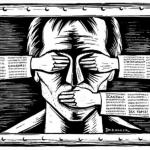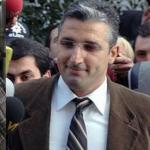In his commentary published in the Guardian, Cengiz Çandar has recently accused of Western media by pursuing a dubious agenda against the AKP government in portraying the current developments in Turkey as signs of the rise of a police state. With respect to the arrests of four journalists working for Oda TV, Çandar emphasised that they were not arrested due to their journalistic activities or their opinions. They were arrested rather because "they are suspected of being part of a plot to topple the civilian government." He declared to the Western world even without a word of caution: "freedom of speech is part of the daily routine in Turkey."
Çandar was not alone in his views. From the English-speaking media on Turkey, in his column in Today's Zaman, Etyen Mahçupyan suggested that press in Turkey has always welcomed military interventions into democratic processes and concluded from there: "it is not freedom of the press that matters here. What matters for them is, for example, to create a psychological atmosphere in which the government can be accused of establishing a repressive regime ahead of the approaching elections." Here it is important to note that the Prime Minister Erdoğan agrees with both of these respected columnists with respect to their views about the arrest of journalists.
Being a pro-government columnist is not a shameful act in itself. Nevertheless, it hardly ensures that one is an ardent human-rights supporter or democrat. What seems to us quite daunting in Çandar's and Mahçupyan's commentaries has been their commitment to discredit any criticism against the apparent violations of freedom of expression by accusing them of being a part of a hypothetical political alliance supporting a planned military coup against the AKP government.
Let's have a quick look at what happened to journalists lately. Mustafa Balbay, a columnist in the daily newspaper Cumhuriyet, is under arrest since July 2008 due to the Ergenekon investigation: two and a half years in jail without being proven guilty. Pioneering human rights journalist, Ahmet Şık and the World Press Freedom Hero in 2010, Nedim Şener were also arrested by the police again because of their alleged affiliation with Ergenekon investigation. The arrests of Şık and Şener were followed by police raids to liberal daily Radikal newspaper and Ithaki Publishing House. During these raids, police officers deleted Ahmet Şık's unpublished book draft "The Imam's Army". Guess what: The book relies upon a comprehensive research on the organisation of Gülen movement within state institutions, makes note of scandalous impacts of this organisations and questions the widespread portrayal of the Gülen movement simply as a civil society.
Freedom of expression has never been included certain forms of speech with peculiar contents in this country. This is already obvious for human rights activists, leftists and democrats. In addition, given the outrageous arrests of journalists that have been happening during the last couple of months, the situation has become much more acute. In response to Çandar's claim that freedom of speech is the daily routine in Turkey and Mahçupyan's assertion that disregards any concern about current violations of freedom of expression, we suggest an alternative look and argue that freedom from expression has always been an integral part of our daily lives and seems to become much more so in near future. (VY/SE)








